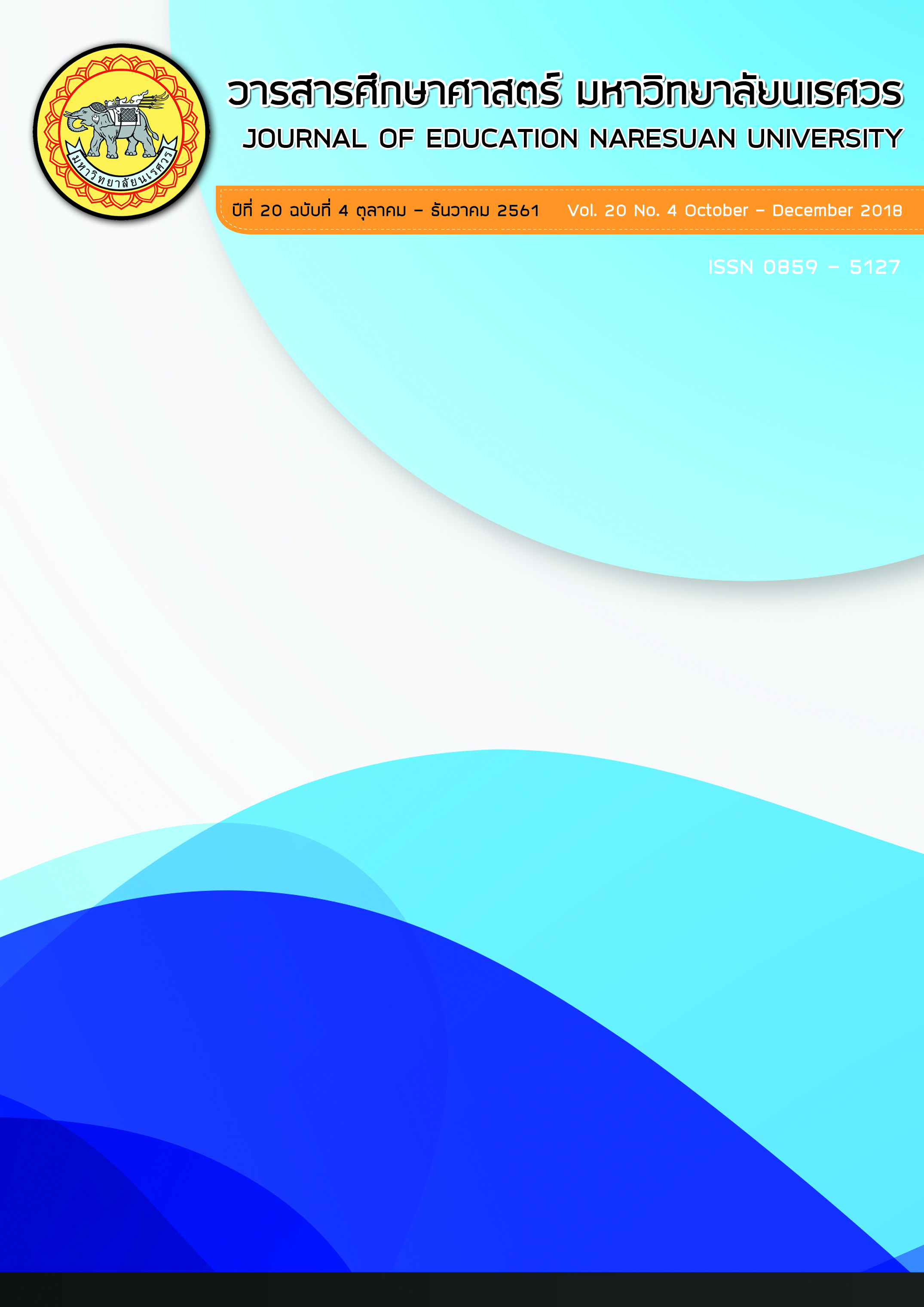ผลการจัดการเรียนรู้โดยใช้ผู้ทรงภูมิปัญญาช่วยเหลือเรียนรู้ที่ส่งเสริมความสามารถในการวิเคราะห์ความน่าเชื่อถือของหลักฐานทางประวัติศาสตร์ ของนักเรียนชั้นมัธยมศึกษาตอนต้น; THE RESULTS OF LEARNING MANAGEMENT USING SCAFFOLDING WISDOM HOLDER TO PROMOTE THE ABILITY ANALYSIS RELIABILITY OF HISTORICAL SOURCES FOR JUNIOR HIGH SCHOOL STUDENTS
Main Article Content
Abstract
การวิจัยครั้งนี้มีวัตถุประสงค์เพื่อศึกษาความสามารถในการวิเคราะห์ความน่าเชื่อถือของหลักฐานทางประวัติศาสตร์ระหว่างจัดการเรียนรู้โดยใช้ผู้ทรงภูมิปัญญาช่วยเหลือเรียนรู้ ของนักเรียนชุมนุมประวัติศาสตร์ ชั้นมัธยมศึกษาตอนต้น และเปรียบเทียบผลสัมฤทธิ์ทางการเรียนก่อนและหลังการจัดการเรียนรู้ของนักเรียน โดยใช้ผู้ทรงภูมิปัญญาช่วยเหลือเรียนรู้ กลุ่มตัวอย่าง คือ นักเรียนชุมนุมประวัติศาสตร์ชั้นมัธยมศึกษาตอนต้น โรงเรียนจ่านกร้อง อำเภอเมือง จังหวัดพิษณุโลก จำนวน 20 คน ภาคเรียนที่ 1 ปีการศึกษา 2559 ซึ่งได้มาโดยการเลือกแบบเจาะจง (Purposive sampling) เครื่องมือที่ใช้ในการวิจัยประกอบด้วย แผนการจัดการเรียนรู้โดยใช้ผู้ทรงภูมิปัญญาช่วยเหลือเรียนรู้จำนวน 4 แผน แบบประเมินความสามารถในการวิเคราะห์ความน่าเชื่อถือของหลักฐานทางประวัติศาสตร์ และแบบทดสอบวัดผลสัมฤทธิ์ทางการเรียน ดำเนินการวิจัยโดยใช้เวลาในการจัดการเรียนรู้เป็นเวลา 24 ชั่วโมง วิเคราะห์ข้อมูลโดยใช้สถิติค่าเฉลี่ย () ส่วนเบี่ยงเบนมาตรฐาน (S.D.) และสถิติ t – test dependent ผลการวิจัย พบว่า
1. นักเรียนมีความสามารถในการวิเคราะห์ความน่าเชื่อถือของหลักฐานทางประวัติศาสตร์ ครั้งที่ 3 อยู่ในระดับมากที่สุด ( = 3.52) รองลงมา คือ ครั้งที่ 2 อยู่ในระดับปานกลาง (
= 2.50) และครั้งที่ 1 อยู่ในระดับน้อย (
= 1.49) ตามลำดับ
2. นักเรียนมีผลสัมฤทธิ์ทางการเรียนหลังเรียนสูงกว่าก่อนเรียน อย่างมีนัยสำคัญทางสถิติที่ระดับ .01
THE RESULTS OF LEARNING MANAGEMENT USING SCAFFOLDING WISDOM HOLDER TO PROMOTE THE ABILITY ANALYSIS RELIABILITY OF HISTORICAL SOURCES FOR JUNIOR HIGH SCHOOL STUDENTS
The purposes of research were to study the ability on analysis reliability of historical sources during learning management with the scaffolding wisdom holder for junior high school students and compare the achievement between before and after learning management with the scaffolding wisdom holder. The sample group junior 20 selected high school students historic group at Janokrong School, the first Semester of 2016 by purposive sampling. Research instruments consisted of 4 learning plan management using the scaffolding wisdom holder, evaluation form of reliability of historical sources and the learning achievement test. Conducted research with learning management for 24 hours. The statistics which used for data analysis were the mean, the standard deviation and t-test Dependent. The results of the research were:
1. The student’s ability in the analysis of reliability of historical sources was at the highest level at the third time ( = 3.52), followed by moderate at the second time (
= 2.50) and at the least level in the first time (
= 1.49)
2. The student’s achievement after learning higher than before at the statistical significance. 01
Article Details
The owner of the article does not copy or violate any of its copyright. If any copyright infringement occurs or prosecution, in any case, the Editorial Board is not involved in all the rights to the owner of the article to be performed.
References
Dungdee, S. (2012). The results of learning management using scaffolding for learning achievement and learning retention on the geographical instruments using on social studies, religion, and culture for matthayomsuksa 2 students (Independent Study). Phitsanulok: Naresuan University. (in Thai)
Eiamprapai, W. (1992). Historical sources. Bangkok: Odean Store. (in Thai)
James S. Vacca (2008). Using scaffolding techniques to teach a lesson about the civil war. International Journal of Humanities and Social Science, 18, 151-161.
Klomim, K. (2014). A development of a learning model based on constructivist theory of a scaffolding to enhance mathematic problem solving skill for lower secondary students. Journal of Education Naresuan University, 16(2), 129-138. (in Thai)
Sriruangrit, P. (2006). The application of Vygotsky’s zone of proximal development (ZPD) to develop an English writing instructional model for student’s at the higher education level (Master thesis). Khon Kaen: Khon Kaen University. (in Thai)
Sutthirat, C. (2014). Remedial Teaching: Fill potential learners. Bangkok: V. Print. (in Thai)
Vygotsky L. S. (1978). Mind in Society: The development of Higher Phycological Process. Cambridge: Harvard University Press.
Wood, D., Bruner, J., & Ross, G., (1976). The role of tutoring in problem. Journal of Child Psychology and Psychiatry, 17, 89-100.

